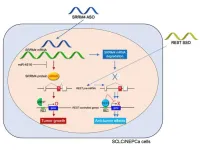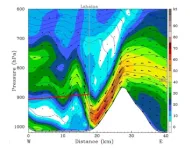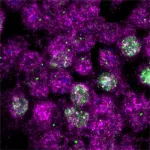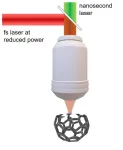(Press-News.org) A world-first study has found low-dose aspirin may treat flu-induced blood vessel inflammation, creating better blood flow to the placenta during pregnancy.
Animal studies examined whether the treatment for preeclampsia could be applied to flu infections – and the results, according to the research team, were very promising.
Lead researcher and RMIT Post-Doctoral Research Fellow, Dr Stella Liong, said flu infections during pregnancy can resemble preeclampsia, a pregnancy complication that causes inflammation to the aorta and blood vessels.
Low-dose aspirin is commonly taken to prevent preeclampsia, as it stops the body from creating chemicals that cause inflammation.
“When the vascular system is inflamed, it leads to poor blood flow and affects the aorta’s function,” she said.
“This is especially a problem during pregnancy where good blood flow to the placenta is crucial to the development of the fetus.”
The research, led by RMIT University in collaboration with Trinity College Dublin, Ireland Professor John O’Leary and University of South Australia Professor Doug Brooks, found fetuses and placenta from mice with influenza A were smaller than those from uninfected mice.
Markers of low oxygen to the blood and poor blood vessel development were also evident in the fetuses.
However, mice treated daily with low-dose aspirin had less inflammation and improved fetal development and offspring survival.
While the research was still awaiting human clinical trials, Liong said low-dose aspirin was already recognised as safe to take during pregnancy.
However, the research team recommended pregnant people seek medical advice before taking new medications.
Brooks said influenza A infections during pregnancy was a big concern as every pregnancy overlaps with part of a flu season.
“There are long term implications for both the mother and the fetus, and aspirin might provide a simple solution for preventing this influenza associated pathology,” Brooks said.
Why flu infection is dangerous during pregnancy
O’Leary said the research findings had huge implications for pregnancy and seasonal influenza virus infections for pregnant people.
“This study shines a light, for the first time, on the role of vascular inflammation associated with influenza virus and the potential dramatic effect of the disease-modifying drug aspirin, in low dosage, in pregnant women with co-morbid influenza,” O’Leary said.
While there weren’t many studies of the impacts of flu infections during pregnancy, project lead and RMIT Professor Stavros Selemidis said it was clear that pregnancy changed how the body responded to the virus.
Liong and Selemidis’ earlier breakthrough research found the flu virus during pregnancy could trigger a damaging hyperactive immune response, causing the virus to spread around the body from the lungs through the blood vessels.
“We used to think the flu virus just stayed in the lungs, but during pregnancy it escapes from the lungs to the rest of the body,” Selemidis said.
“This infection could set you up for cardiovascular disease later in life, but also set up cardiovascular disease in the offspring later in life.”
While vaccination was still the considered the best way to prevent flu infection during pregnancy, Selemidis pointed out vaccination rates were generally low in the pregnant population.
“Low vaccination rates aside, the flu shot may not generate the perfect immune response, especially if someone is pregnant or has an underlying medical condition,” he said.
“That’s why it’s useful to have a potential back up in low-dose aspirin to help prevent vascular dysfunction during pregnancy and improve fetal development.”
“Low dose aspirin prevents endothelial dysfunction in the aorta and foetal loss in pregnant mice infected with influenza A virus” was published in Frontiers in Immunology (DOI: 10.3389/fimmu.2024.1378610 ).
Madison Coward-Smith, Stella Liong, Osezua Oseghale, Jonathan R. Erlich, Mark A. Miles, Felicia Liong, Kurt Brassington, Steven Bozinovski, Ross Vlahos, Robert D. Brooks , Doug A. Brooks, John J. O’Leary and Stavros Selemidis are co-authors.
END
Low-dose aspirin could help prevent pregnancy complications caused by flu infections
A world-first study has found low-dose aspirin may treat flu-induced blood vessel inflammation, creating better blood flow to the placenta during pregnancy.
2024-07-03
ELSE PRESS RELEASES FROM THIS DATE:
Splicing it all together in the fight against cancer
2024-07-03
Osaka, Japan – Neuroendocrine tumors, including small cell lung cancer and neuroendocrine prostate cancer, are very aggressive with high chances of spreading. However, many individuals develop resistance to few available treatment options, leading to poor patient outcomes. Researchers are therefore aiming to develop new therapeutic methods that focus on the disease-specific molecular mechanisms of these tumors.
In a recent article published in Molecular Therapy: Nucleic Acids, a team of researchers at Osaka University describe a strategy targeting one such mechanism, called RNA splicing.
RNA splicing is the process ...
World’s first research journal dedicated to psychology and artificial intelligence announced
2024-07-03
Taylor & Francis has announced the launch of the Journal of Psychology and AI, an open access journal that aims to foster dialogue between technologists developing artificial intelligence (AI) systems and psychology researchers exploring human behavior, cognitions, and emotions.
As AI technology becomes increasingly integrated into our lives, the new journal will publish reports on direct human interaction with AI as well as exploring how it is influencing the way we interact with and think about the world.
Other research areas relevant to psychology and AI include using AI for the ...
Zayed to lead new Division of Surgical Sciences
2024-07-03
Mohamed A. Zayed, MD, PhD, a vascular surgeon known for his pioneering research in vascular diseases, has been appointed director of the newly established Division of Surgical Sciences in the Department of Surgery at Washington University School of Medicine in St. Louis. He will assume his new role July 1.
Zayed, a professor of surgery, of radiology, of molecular cell biology, and of biomedical engineering, has more than 25 years of experience leading multifaceted research programs in biotech, medical startups ...
How dust pollution from shrinking Great Salt Lake affects communities disproportionately
2024-07-03
New research from the University of Utah demonstrates how wind-carried dust from the exposed bed of Great Salt Lake is disproportionately affecting disadvantaged communities in the Salt Lake metro area.
The findings suggest restoring the lake to a healthy water level would reduce disparities in harmful dust exposure experienced by different racial/ethnic and socioeconomic groups, along with delivering other ecological and economic benefits.
Exposure to particulate pollution arising from dry portions of the playa is highest among Pacific Islanders and Hispanics and lowest among white people compared to other racial/ethnic ...
Clever clothes! Seams in clothing capture body movement
2024-07-03
Everyday clothing may soon be able to capture and record body movements according to new research published by the Universities of Bristol and Bath.
Harmless low voltages are passed through conductive threads which are stitched into garment seams to create electrical circuits. Their resistance changes with the movement of the wearer's body. The work opens up new possibilities to make digital clothing which senses and captures movements much more accurately than is possible using current phones and smart watches.
The paper, presented at the Designing Interactive Systems (DIS) conference in Copenhagen ...
AMS science preview: Maui wildfire, Salt Lake drying, traffic and weather
2024-07-02
The American Meteorological Society continuously publishes research on climate, weather, and water in its 12 journals. Many of these articles are available for early online access–they are peer-reviewed, but not yet in their final published form.
Below is a selection of articles published early online recently. Some articles are open-access; to view others, members of the media can contact kpflaumer@ametsoc.org for press login credentials.
JOURNAL ARTICLES
Understanding Observed Precipitation Change and the New Climate Normal from the Perspective of Daily Weather Types in the Southeast U.S.
Journal of ...
Research spotlight: Identifying genes to prolong an anti-tumor immune response
2024-07-02
How would you summarize your study for a lay audience?
We set out to identify genes that are commonly expressed in CD8+ T cells, killer immune cells that can drive anti-tumor immunity, across many types of human cancers. Our goal was to uncover new therapeutic targets, which could inform novel treatment strategies that could benefit many patients. To do this, we developed a novel mathematical method that can be applied to data from many types of cancers.
What knowledge gaps does your study help to fill?
We know the presence fof CD8+ T cells is essential for ...
SRI is developing a new malaria treatment that aims to protect from the disease
2024-07-02
SRI today announced that researchers are developing a new treatment that aims to provide a better option to fight malaria, particularly for people in low-income and rural regions. Researchers in SRI’s Pharmaceutical Sciences Lab are working on an affordable, shelf-stable anti-malarial drug formulation that could provide months of protection against the mosquito-borne disease with just a single injection, which means that individuals would no longer have to worry about missing a dose. Additionally, it has a low propensity for resistance and can be ...
UV radiation damage leads to ribosome roadblocks, causing early skin cell death
2024-07-02
In a recent study, researchers at Johns Hopkins Medicine suggest the cell’s messenger RNA (mRNA) — the major translator and regulator of genetic material — along with a critical protein called ZAK, spur the cell’s initial response to UV radiation damage and play a critical role in whether the cell lives or dies.
While UV radiation has long been known to damage DNA, it also damages mRNA, and the latest findings, published June 5 in Cell, indicate that mRNAs act as first responders in telling the cells how to manage the stress.
“RNA is a canary in the coal mine. It’s telling the cell, ‘We’ve got major damage here and ...
Precise and less expensive 3D printing of complex, high-resolution structures
2024-07-02
WASHINGTON — Researchers have developed a new two-photon polymerization technique that uses two lasers to 3D print complex high-resolution structures. The advance could make this 3D printing process less expensive, helping it find wider use in a variety of applications.
Two-photon polymerization is an advanced additive manufacturing technique that traditionally uses femtosecond lasers to polymerize materials in a precise, 3D manner. Although this process works well for making high-resolution microstructures, it isn’t widely used in manufacturing ...
LAST 30 PRESS RELEASES:
Study in mice reveals the brain circuits behind why we help others
Online forum to explore how organic carbon amendments can improve soil health while storing carbon
Turning agricultural plastic waste into valuable chemicals with biochar catalysts
Hidden viral networks in soil microplastics may shape the future of sustainable agriculture
Americans don’t just fear driverless cars will crash — they fear mass job losses
Mayo Clinic researchers find combination therapy reduces effects of ‘zombie cells’ in diabetic kidney disease
Preventing breast cancer resistance to CDK4/6 inhibitors using genomic findings
Carbon nanotube fiber ‘textile’ heaters could help industry electrify high-temperature gas heating
Improving your biological age gap is associated with better brain health
Learning makes brain cells work together, not apart
Engineers improve infrared devices using century-old materials
Physicists mathematically create the first ‘ideal glass’
Microbe exposure may not protect against developing allergic disease
Forest damage in Europe to rise by around 20% by 2100 even if warming is limited to 2°C
Rapid population growth helped koala’s recovery from severe genetic bottleneck
CAR-expressing astrocytes target and clear amyloid-β in mouse model of Alzheimer’s disease
Unique Rubisco subunit boosts carbon assimilation in land plants
Climate change will drive increasing forest disturbances across Europe throughout the next century
Enhanced brain cells clear away dementia-related proteins
This odd little plant could help turbocharge crop yields
Flipped chromosomal segments drive natural selection
Whole-genome study of koalas transforms how we understand genetic risk in endangered species
Worcester Polytechnic Institute identifies new tool for predicting Alzheimer’s disease
HSS studies highlight advantages of osseointegration for people with an amputation
Buck Institute launches Healthspan Horizons to turn long-term health data into Actionable healthspan insights
University of Ottawa Heart Institute, the University of Ottawa and McGill University launch ARCHIMEDES to advance health research in Canada
The world’s largest brain research prize awarded for groundbreaking discoveries on how we sense touch and pain
Magnetofluids help to overcome challenges in left atrial appendage occlusion
Brain-clearing cells offer clues to slowing Alzheimer’s disease progression
mRNA therapy restores fertility in genetically infertile mice
[Press-News.org] Low-dose aspirin could help prevent pregnancy complications caused by flu infectionsA world-first study has found low-dose aspirin may treat flu-induced blood vessel inflammation, creating better blood flow to the placenta during pregnancy.






